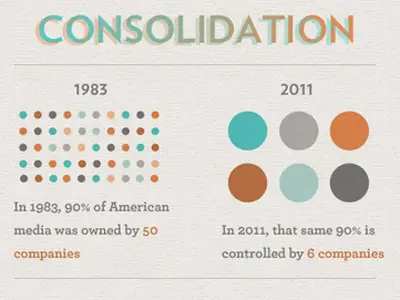EOTO: Media Consolidation
Within the American corporate world, monopolies are considered extremely hurtful and damaging - not only to the market itself, but to consumers' needs and the prices of goods. When the Sherman Anti-Trust Act was passed in 1890, monopolies were outlawed, as well as conspiracies of monopolization within the corporate world. Now, independent companies can share their values, right? Not quite.
This same monopolization is happening within American media. Media merges are now occurring at a faster pace than ever - this results in a few mega conglomerates (often controlled by the wealthy few) to dominate the media industry, resulting in smaller, independent, often investigative voices to be stifled and silenced. This potentially harms the Watchdog Rule of journalism and media. Without a diverse group of media channels, voices, and opinions, the media we consume will continue to grow more homogenous, cookie-cutter, and submissive to big corporations within television, news media, and journalism.
The Federal Communications Commission (FCC) issued new rules regarding cross-ownership within media in 2002 after the Telecommunications Act of 1996. After the rise of skepticism from both citizens and members of Congress regarding large company media merges, the rules were voided on technical grounds by a federal court. After reconvening, the FCC has since relaxed their rules regarding media consolidation, merger companies, and media buying. Since the 1990's, the number of independent news outlets have fallen, due to big media mergers being on a steady incline.
Only 37 years ago, there were 50 companies in charge of most American media. Today, 90% of the media in the United States is controlled by just six corporations: AT&T, CBS, Comcast, Disney, News Corp, and Viacom. These corporations are known as the Big Six. The Big Six essentially acts as a media monopoly. These large companies buy smaller networks and channels of media - along with their direction - therefore, they are able to dictate every show, personality, or advertisement on their channel. For example, CBS Television Stations consists of 28 CBS-owned stations in 17 major U.S. markets. Disney owns and operates some of the most watched networks on television: ABC, ESPN, Lifetime, History, A&E, National Geographic, and many more. AT&T is the largest media conglomerate in the United States after buying Warner Media in 2018, with a total revenue of $163.03 billion (2020). These are only a few examples of top media conglomerates within the industry.
Media consolidation doesn't only occur in television. Magazine companies, social media websites, and newspaper publishers are also subject to being merged or bought out by a larger, more powerful company. For example, Facebook is the #1 social networking platform worldwide, reaching 2.8 billion users. It acts as a media conglomerate or "big media" due to reaching an extreme number of consumers, as well as providing them with news and other information on an extremely large scale. Facebook is owned by Meta, who has since 2012, has acquired Instagram ($1 Billion), Giphy ($400 Million), WhatsApp ($19 Billion), and Oculus VR (2.3 Billion), just to name a few. In January 2022, an antitrust lawsuit against Meta was filed regarding Meta unlawfully accumulating monopoly power via anti-competitive mergers. The lawsuit is still in action, with the Federal Trade Commission still investigating.
These companies, by definition, monopolize. They obtain possession and control of smaller, sometimes completely independent companies, which creates problems not only within the market of buying and selling assets, but within user interfaces, causing independent voices to be silenced, and the overall morale of now one large company to be effected.
Overall, media consolidation is not only harmful to consumers, but companies within the market as well. The use and abuse of media monopolies causes views to be suppressed and companies to succumb to their competitors by being bought out. The projection of large media companies' views on society can cause citizens to feel isolated, unheard, and angry due to companies such as the Big Six and Meta using their power to suppress smaller networks and their messages.







No comments:
Post a Comment